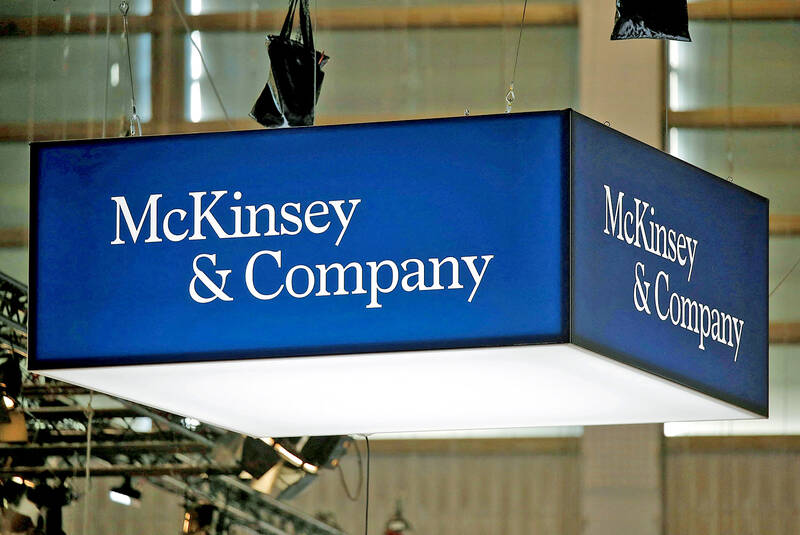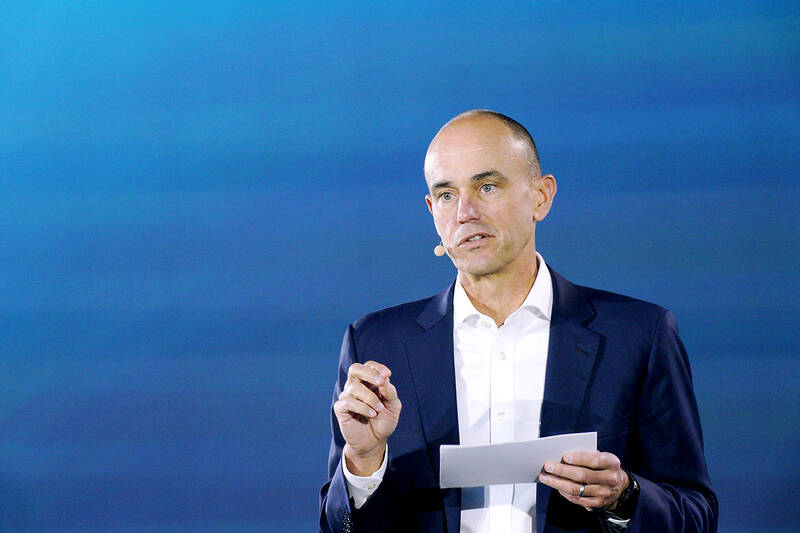McKinsey & Co is planning to eliminate about 2,000 jobs, one of the consulting company’s biggest rounds of cuts ever.
The move by the firm, known for devising staff-reduction plans for its clients, is expected to focus on support staff in roles that do not have direct contact with clients, people with knowledge of the matter said.
Under a plan dubbed “Project Magnolia,” the management team is hoping the move would help preserve the compensation pool for its partners, the people said.

Photo: Reuters
The firm, which has seen rapid growth in its head count during the past decade, is looking to restructure how it organizes its support teams to centralize some of the roles.
The plan is expected to be finalized in the coming weeks, and the final number of roles to be eliminated from its 45,000 workforce could still change, one of the people said.
That head count is up from 28,000 just five years ago and 17,000 in 2012.

Photo: Bloomberg
“We are redesigning the way our non-client-serving teams operate for the first time in more than a decade, so that these teams can effectively support and scale with our firm,” McKinsey media relations director D.J. Carella said in an e-mailed statement.
Carella said the firm is still hiring professionals who deal directly with clients.
The firm posted a record US$15 billion in revenue in 2021, and surpassed that figure last year, one of the people said.
Companies in industries from finance to technology and retailing are reducing staff amid a slowdown in demand and predictions of a looming recession.
Tech companies, including Amazon.com Inc and Microsoft Corp, have announced plans for deep cuts, and Goldman Sachs Group Inc, Morgan Stanley and other top banks have been eliminating thousands of positions.
McKinsey’s move comes two years after Bob Sternfels took over as global managing partner following a vote by its about 650 senior partners to oust his predecessor, Kevin Sneader.
The management shift was the culmination of a tumultuous period for the firm, which took flak for its role in advising the makers of the painkiller OxyContin and faced scrutiny of various other business ties.
Sneader now helps run Goldman Sachs Group Inc’s Asia-Pacific operations.
McKinsey consultants helped popularize the phrase “war for talent” in the late 1990s, a slogan that has come back into vogue in the past few years as a post-COVID-19 pandemic boom led to a frenzied period of hiring and head count expansion across industries. With that growth now starting to wane, companies battling to preserve profits are turning to job cuts at a scale not seen in more than a decade.

Semiconductor business between Taiwan and the US is a “win-win” model for both sides given the high level of complementarity, the government said yesterday responding to tariff threats from US President Donald Trump. Home to the world’s largest contract chipmaker, Taiwan Semiconductor Manufacturing Co (TSMC, 台積電), Taiwan is a key link in the global technology supply chain for companies such as Apple Inc and Nvidia Corp. Trump said on Monday he plans to impose tariffs on imported chips, pharmaceuticals and steel in an effort to get the producers to make them in the US. “Taiwan and the US semiconductor and other technology industries

SMALL AND EFFICIENT: The Chinese AI app’s initial success has spurred worries in the US that its tech giants’ massive AI spending needs re-evaluation, a market strategist said Chinese artificial intelligence (AI) start-up DeepSeek’s (深度求索) eponymous AI assistant rocketed to the top of Apple Inc’s iPhone download charts, stirring doubts in Silicon Valley about the strength of the US’ technological dominance. The app’s underlying AI model is widely seen as competitive with OpenAI and Meta Platforms Inc’s latest. Its claim that it cost much less to train and develop triggered share moves across Asia’s supply chain. Chinese tech firms linked to DeepSeek, such as Iflytek Co (科大訊飛), surged yesterday, while chipmaking tool makers like Advantest Corp slumped on the potential threat to demand for Nvidia Corp’s AI accelerators. US stock

The US Federal Reserve is expected to announce a pause in rate cuts on Wednesday, as policymakers look to continue tackling inflation under close and vocal scrutiny from US President Donald Trump. The Fed cut its key lending rate by a full percentage point in the final four months of last year and indicated it would move more cautiously going forward amid an uptick in inflation away from its long-term target of 2 percent. “I think they will do nothing, and I think they should do nothing,” Federal Reserve Bank of St Louis former president Jim Bullard said. “I think the

SUBSIDIES: The nominee for commerce secretary indicated the Trump administration wants to put its stamp on the plan, but not unravel it entirely US President Donald Trump’s pick to lead the agency in charge of a US$52 billion semiconductor subsidy program declined to give it unqualified support, raising questions about the disbursement of funds to companies like Intel Corp and Taiwan Semiconductor Manufacturing Co (台積電). “I can’t say that I can honor something I haven’t read,” Howard Lutnick, Trump’s nominee for commerce secretary, said of the binding CHIPS and Science Act awards in a confirmation hearing on Wednesday. “To the extent monies have been disbursed, I would commit to rigorously enforcing documents that have been signed by those companies to make sure we get